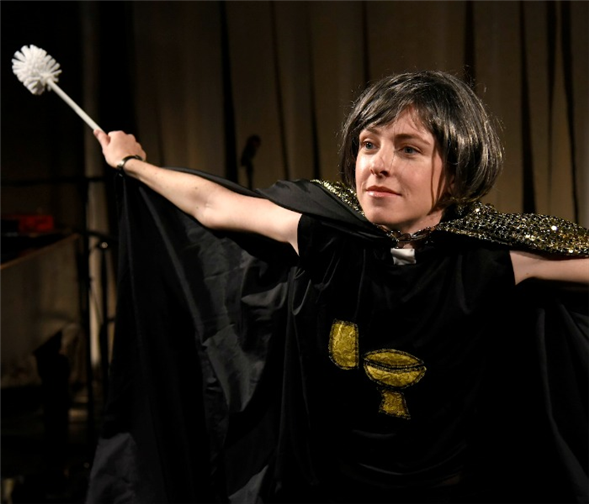Translate Page

Why writer/performer Eliza Bent improvises a key moment in her new show Toilet Fire
---
Welcome to Behind the Scene, TDF Stages' ongoing series where theatre artists write about their creative process.
For me, the challenge of making a solo show was wanting to avoid the genre's clichés: the stories from real life, the self-reflection, the explorations of relationships with one's parents, the eureka moment, the corny This-is-What-I've-Learned ending.
I don't mean to put down solo shows -- there are certainly many wonderful ones. But generally speaking, I find the format to be problematic. The tropes that make some solo shows strong are the same ones that cause others to be deadly, self-indulgent, and, worse, self-pitying.
I could see a glaze of disinterest wash over people's eyes the instant I revealed that my play about digestion was, in fact, a solo show (assuming they hadn't already fled after hearing "a play about digestion"). I totally understood their hesitations. As I developed the piece, I began to call Toilet Fire: Rectums in the Rectory a "single-actor play" since I had a hunch I wouldn't be able to stomach what a solo show required in terms of structure, taste, and aesthetics. (Ultimately, it turned out to be a duo-show since Alaina Ferris plays a cantor who sings and gabs with the audience throughout the piece.)
At the suggestion of my dramaturg, Jess Barbagallo, I began to rewrite my toilet tales in other voices besides my own. This opened up a world of opportunities. I could play characters and embellish my own stories! I could try on accents and nationalities and genders that I might not otherwise get to do. In addition to shaking things up dramaturgically, it released a sense of fun and play in my writing.
I knew I wanted to use the framework of an ancient religious ritual, a Catholic mass, to hang these anecdotes on. But at the conclusion of the ritual, it was evident that I would need to explain myself. The multi-character play I had built would have to break and a solo-show section would need to take over for the final third of the production. I had to explain to the audience why digestion and religion are so intricately entwined for me, Eliza Bent.
{Image1}
I spent hours writing (and rewriting) about how my two main religious influences, Catholicism and Judaism, are connected to my toilet troubles. That meant that the end of the show would have one of those This-is-What-I've-Learned epiphanies. However, everything preceding it would (hopefully) abate any corniness. Still, something was missing.
"We understand your relationship to religion, but you still haven't told us that these are your toilet stories," Jess pointed out. I balked. "Isn't it obvious?" I asked. "No," Kevin Laibson, the director, said with crossed arms. I protested in my most pleading, whiny, and self-indulgent voice: "But I don't want to say, 'Living with chronic pain sure is a drag! That's why it's so important to laugh!'" Then Kevin said, "What if you improvised it? You know you want to hit a few things here, so what if you just don't write them out? You'll be searching for the words and it will feel authentic."
He was onto something.
The things I knew I needed to communicate: 1. Telling the truth about my poop (i.e. that the toilet tales are my own). 2. That I hoped doing a show about digestion would help me figure out some of my own problems. 3. That I've had a stomach ache for 14 years.
The trick was, and continues to be, not letting this moment devolve into self-pity or asking the audience to feel bad for me. I'm just laying out the truth of the play, which is that suffering sucks. That's why my show is a comedy. It's an attempt to relieve some of that anguish.
That improvised, three-beat section ends up being both the hardest and easiest part of the show. It's difficult because I'm exposing a very painful personal truth that I never speak about. But I also get this sense of relief by talking about a problem that I usually mask with jokes. When I admit that "I've had a stomach ache for 14 years," I see flashes of recognition on the audience's faces. We all carry around some type of pain, whether it's physical, emotional, or spiritual. That's what gives me strength to finally tell my own story.
---
Eliza Bent is a playwright and performer who also frequently writes articles for TDF Stages.
Toilet Fire tickets are available through TDF's Off-Off@$9 Program.
Photos by Knud Adams